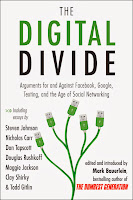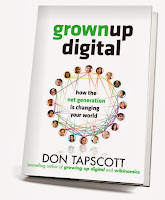Recommendations on Social Media Books
I do a lot of reading as we all know and I'm quite interested in social media and its relevance to modern society. I regularly get asked for recommendations for books to help get a grasp on social media. I often find it hard to recommend just one book. It's like asking who is your favorite pet or child. Well, here is my list of books on social media that I've read and found useful. It's a list of books I both like (Jeff Jarvis, I'm looking at you) and dislike (Nicholas Carr, this one's for you), but all of which are relevant in the discussion. This list was composed in November, 2013. I anticipate that I will need to update it again in another year as I continue to devour books on the subject. All that being said, if there's any that strike your fancy, that you've read, or that you're interested in knowing more about, don't hesitate to let me know.
The cumulative knowledge that I have culled from reading all of these has been that social media may be a new format of interaction for us but is not entirely in terms of how we excahnge and have dialogue among humans. There is ample meaningless communications that go on day-to-day ("Hi, how are you?") and there's also deep and profound communications that occur. Social media is no different--except that unlike ever before, it can be captured and quantified. So while some may think Twitter is a sign of the end-times and full of irrelevant material, they miss how much of our day-to-day is full of irrelevance and meaningless banter ("It's a nice day."). And like many things in our culture, it's easy to point to simplicity (ignorant tweets) than to point to complexity (because that requires context and nuance). But there is more value to be gained than problems when as we move into social media.
The cumulative knowledge that I have culled from reading all of these has been that social media may be a new format of interaction for us but is not entirely in terms of how we excahnge and have dialogue among humans. There is ample meaningless communications that go on day-to-day ("Hi, how are you?") and there's also deep and profound communications that occur. Social media is no different--except that unlike ever before, it can be captured and quantified. So while some may think Twitter is a sign of the end-times and full of irrelevant material, they miss how much of our day-to-day is full of irrelevance and meaningless banter ("It's a nice day."). And like many things in our culture, it's easy to point to simplicity (ignorant tweets) than to point to complexity (because that requires context and nuance). But there is more value to be gained than problems when as we move into social media.
Recommended Books for Social Media
- Anderson, Chris. Free: The Future of a Radical Price. New York: Hyperion, 2009. Print.
- Anderson, Chris. The Long Tail: Why the Future of Business Is Selling Less of More. New York: Hyperion, 2006. Print.
- Anderson, Chris. Makers: The New Industrial Revolution. New York: Crown Business, 2012. Print.
- Andrews, Lori B. I Know Who You Are and I Saw What You Did: Social Networks and the Death of Privacy. New York: Free Press, 2012. Print.
- Ariely, Dan. The (honest) Truth About Dishonesty: How We Lie to Everyone-Especially Ourselves. , 2012. Print.
- Bauerlein, Mark. The Digital Divide: Arguments for and against Facebook, Google, Texting, and the Age of Social Networking. New York: Jeremy P. Tarcher/Penguin, 2011. Print.
- Berger, Jonah. Contagious: Why Things Catch on. New York: Simon & Schuster, 2013. Print.
- Bilton, Nick. I Live in the Future and Here's How It Works: Why Your World, Work, and Brain Are Being Creatively Disrupted. New York: Crown Business, 2010. Print.
- Blascovich, Jim, and Jeremy Bailenson. Infinite Reality: Avatars, Eternal Life, New Worlds, and the Dawn of the Virtual Revolution. New York: William Morrow, 2011. Print.
- Botsman, Rachel, and Roo Rogers. What's Mine Is Yours: The Rise of Collaborative Consumption. New York: Harper Business, 2010. Print.
- Boyle, James. The Public Domain: Enclosing the Commons of the Mind. New Haven, Conn: Yale University Press, 2008. Print.
- Brown, Brené. The Gifts of Imperfection: Let Go of Who You Think You're Supposed to Be and Embrace Who You Are. Center City, Minn: Hazelden, 2010. Print.
- Carr, Nicholas G. The Shallows: What the Internet Is Doing to Our Brains. New York: W.W. Norton, 2010. Print.
- Chatfield, Tom. 50 Digital Ideas: You Really Need to Know. London: Quercus, 2011. Print.
- Chatfield, Tom. Fun Inc: Why Games Are the 21st Century's Most Serious Business. London: Virgin, 2010. Print.
- Chatfield, Tom. How to Thrive in the Digital Age. London: Macmillan, 2012. Print.
- Christakis, Nicholas A, and James H. Fowler. Connected: The Surprising Power of Our Social Networks and How They Shape Our Lives. New York: Little, Brown and Co, 2009. Print.
- Crawford, Matthew B. Shop Class As Soulcraft: An Inquiry into the Value of Work. New York: Penguin Press, 2009. Print.
- Diaz-Ortiz, Claire. Twitter for Good: Change the World One Tweet at a Time. San Francisco, CA: Jossey-Bass, 2011. Print.
- Duhigg, Charles. The Power of Habit: Why We Do What We Do in Life and Business. New York: Random House, 2012. Print.
- Matthew, and Soumitra Dutta. Throwing Sheep in the Boardroom: How Online Social Networking Will Transform Your Life, Work and World. Chichester, England: Wiley, 2008. Internet resource.
- Forni, Pier M. Choosing Civility: The Twenty-Five Rules of Considerate Conduct. New York: St. Martin's Press, 2002. Print. Fraser,
- Gottschall, Jonathan. The Storytelling Animal: How Stories Make Us Human. Boston: Houghton Mifflin Harcourt, 2012. Print.
- Hadnagy, Christopher. Social Engineering: The Art of Human Hacking. Indianapolis, IN: Wiley, 2011. Print.
- Holiday, Ryan. Trust Me I'm Lying: Confessions of a Media Manipulator. New York: Portfolio, 2012. Print.
- Howe, Jeff. Crowdsourcing: Why the Power of the Crowd Is Driving the Future of Business. New York: Crown Business, 2008. Print.
- Jarvis, Jeff. Public Parts: How Sharing in the Digital Age Improves the Way We Work and Live. New York, NY: Simon & Schuster, 2011. Print.
- Johnson, Steven. Everything Bad Is Good for You: How Today's Popular Culture Is Actually Making Us Smarter. New York: Riverhead Books, 2005. Print.
- Johnson, Steven. Future Perfect: The Case for Progress in a Networked Age. New York: Riverhead Books, 2012. Print.
- Lanier, Jaron. You Are Not a Gadget: A Manifesto. New York: Alfred A. Knopf, 2010. Print.
- Levine, Robert. Free Ride: How Digital Parasites Are Destroying the Culture Business, and How the Culture Business Can Fight Back. New York: Doubleday, 2011. Print.
- Li, Charlene. Open Leadership: How Social Technology Can Transform the Way You Lead. San Francisco: Jossey-Bass, 2010. Print.
- McRaney, David. You Are Now Less Dumb: How to Conquer Mob Mentality, How to Buy Happiness, and All the Other Ways to Outsmart Yourself. , 2013. Print.
- McGonigal, Jane. Reality Is Broken: Why Games Make Us Better and How They Can Change the World. New York: Penguin Press, 2011. Print.
- Mele, Nicco. The End of Big: How the Internet Makes David the New Goliath. , 2013. Print.
- Mycoskie, Blake. Start Something That Matters. New York: Spiegel & Grau, 2011. Print.
- Pariser, Eli. The Filter Bubble: What the Internet Is Hiding from You. New York: Penguin Press, 2011. Print.
- Partnoy, Frank. Wait: The Art and Science of Delay. New York: PublicAffairs, 2012. Print.
- Postman, Neil. Amusing Ourselves to Death: Public Discourse in the Age of Show Business. New York: Viking, 1985. Print.
- Postman, Neil. Technopoly: The Surrender of Culture to Technology. New York: Knopf, 1992. Print.
- Reese, Byron. Infinite Progress: How the Internet and Technology Will End Ignorance, Disease, Poverty, Hunger, and War. Austin, Tex: Greenleaf Book Group, 2013. Print.
- Rifkin, Jeremy. The Third Industrial Revolution: How Lateral Power Is Transforming Energy, the Economy, and the World. New York: Palgrave Macmillan, 2011. Print.
- Rushkoff, Douglas, and Leland Purvis. Program or Be Programmed: Ten Commands for a Digital Age. Berkeley, CA: Soft Skull Press, 2011. Print.
- Rushkoff, Douglas. Present Shock: When Everything Happens Now. New York: Current, 2013. Print.
- Shirky, Clay. Cognitive Surplus: How Technology Makes Consumers into Collaborators. New York: Penguin Books, 2011. Print.
- Shirky, Clay. Here Comes Everybody: The Power of Organizing Without Organizations. New York: Penguin Press, 2008. Print.
- Sommers, Sam. Situations Matter: Understanding How Context Transforms Your World. New York: Riverhead Books, 2011. Print.
- Steiner, Christopher. Automate This: How Algorithms Came to Rule Our World. New York: Portfolio/Penguin, 2012. Print.
- Sunstein, Cass R. Infotopia: How Many Minds Produce Knowledge. New York ;Oxford: Oxford University Press, 2008. Print.
- Tapscott, Don. Grown Up Digital: How the Net Generation Is Changing Your World. New York: McGraw-Hill, 2009. Print.
- Tavris, Carol, and Elliot Aronson. Mistakes Were Made (but Not by Me): Why We Justify Foolish Beliefs, Bad Decisions, and Hurtful Acts. Orlando, Fla: Harcourt, 2007. Print.
- Thomas, Douglas, and John S. Brown. A New Culture of Learning: Cultivating the Imagination for a World of Constant Change. Lexington, Ky: CreateSpace?, 2011. Print.
- Turkle, Sherry. Alone Together: Why We Expect More from Technology and Less from Each Other. New York: Basic Books, 2011. Print.
- Waal, F B. M. The Age of Empathy: Nature's Lessons for a Kinder Society. New York: Harmony Books, 2009. Print.
- Wasik, Bill. And Then There's This: How Stories Live and Die in Viral Culture. New York: Viking, 2009. Print.
- Weinberger, David. Too Big to Know: Rethinking Knowledge Now That the Facts Aren't the Facts, Experts Are Everywhere, and the Smartest Person in the Room Is the Room. New York: Basic Books, 2011. Print.
- Williams, Juan. Muzzled: The Assault on Honest Debate. New York: Crown Publishers, 2011. Print.
Did you enjoy this read? Let me know your thoughts down below or feel free to browse around and check out some of my other posts!. You might also want to keep up to date with my blog by signing up for them via email. This work is licensed under a Creative Commons Attribution-ShareAlike 4.0 International License.
This work is licensed under a Creative Commons Attribution-ShareAlike 4.0 International License.


Comments
Post a Comment